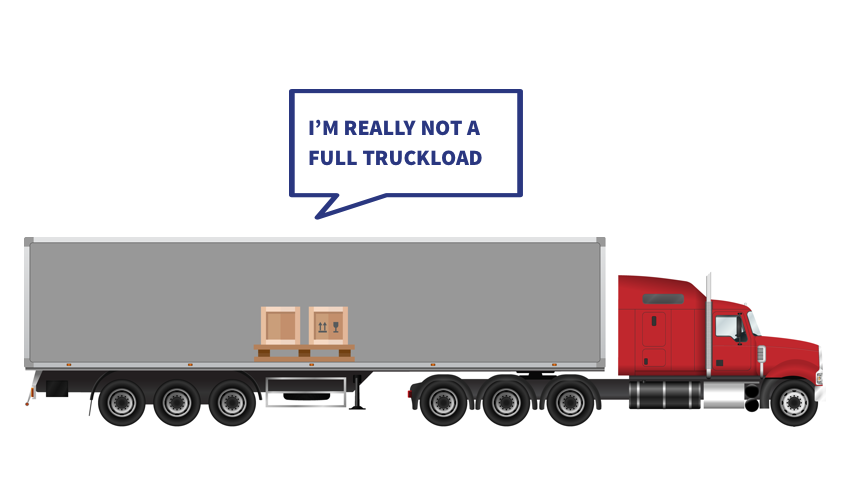False Use of Expedite Up-Charge is a Key Example
Starting off with some really good news … I’m here to tell you there are real and practical solutions out there to our nationwide driver shortage.
Got your attention? Good.
An explanation is in order, however, to get you ready for the beauty of the solution we’ve developed at Zip Xpress. If you’re at all hopeful about and committed to the transportation industry, I believe you’ll be excited by what you’re going to read.
Innocent-Sounding New Term
The trucking business, as they used to call it, has always had a lot of insider lingo.
An example: Some of us in the industry remember very well when the term “Exclusive Use of a Trailer” popped up and what it meant.
The term, dating back to the 1960s, refers to a shipper buying the entire trailer, no matter how much – or how little – product had to be moved. It could be as little as one special automotive part, for example, being transported as “exclusive use” freight.
One prototype fender.
All alone on a pallet.
Back in the whole, cavernous trailer.
(This is a true example, by the way; we’ll return to the subject shortly.)
Another true thing: Michigan’s own auto companies were the originators of this “Exclusive Use” practice and were the main contributors to its eventual industry-wide adoption. They infected all of trucking with a virulent bad habit that’s still with us today: wastefully shipping air, not a carefully packed trailer full of product, just because some deep-pocket entity agrees to “Exclusive Use.”
In many ways, of course, things were different back when this all started.
It was a time when the indisputably dominant U.S. auto companies were making huge profits, even in the face of their flagrantly wasteful business practices at every level of operation.
Dominant, that is, until Toyota, Honda and others came along.
The newcomers were scoffed at by General Motors for producing “large lawn mowers,” not real cars. For sure, they would never be a competitive factor, GM said. Fast forward from those arrogant days … and you probably heard the news that GM, once the largest car maker in the world, is now in second place. It was passed in the fast lane by one of those lawn-mower competitors who simply outsmarted and outperformed year after year. Early on, in fact, those leaner, meaner carmakers were sharper about shipping and didn’t fall for the “Exclusive Use” trailers very often with only one fender on board.
Unfortunately, an embarrassing number of big concerns still ship wastefully, coast to coast, year after year. The reason? Usually sheer laziness, instead of being thorough and efficient for the sake of the customer.
New Term…But Same-Old Same-Old
“Expedite,” they call it now.
I have no quarrel, of course, with an urgent truckload of product outbounding as an “Expedite” and getting special handling all the way.
That’s what good business is all about; sometimes you gotta get it there yesterday!
However, many in our industry are still playing at that old game of “Charge ’em High … Find a Cut-Rate Carrier … Keep the Difference.”
Unfortunately, that’s what many Expedites have become. No more “Exclusive Use of a Trailer,” but the same old wasteful story.
Whatever you want to call it, Expedite usually means trailers that are grossly underutilized. Our industry simply cannot sustain this practice, considering the current driver shortage and a suite of new rules pending in 2017. Those rules alone are expected to decrease our capacity between 10 and 30 percent.
It’s really a shame that the auto companies, the suppliers, and many corporations refuse to recognize their bad shipping habits … especially since the MSRP price tag of a new car is so high and getting higher. You know they’re sneaking the shipping waste right into that window sticker!
Having worked years ago in an automotive plant in Detroit, I understand how bad it is to shut a line down from lack of an essential material or part for production, but I also know that there are solutions. Shippers, carriers, the brokers in between; all of us need to work on the efficiencies right away. Next year already looks like a serious scenario for this industry.
Fully Optimize, Every Time
Zip Xpress/Green Transportation has perfected a way for shippers to get “Exclusive Use or Expedited” service delivered safe and sound … without paying for the entire load.
In many cases the savings exceed 60 to 70 percent over the customer’s previous costs.
We currently have 14 very happy, carbon-saving customers that are using our optimization process with a perfect record of “on time and damage-free.” This service also includes Call and Reserve Your Seat … even if you call Monday and won’t have it ready until 8 p.m. Friday. Your “seat” will be reserved in first class and you will receive Friday-to-Monday deliveries to anywhere in our service area, including specific delivery times
It actually cost less to reserve your seat in advance. We will even pick up on Saturday until noon and perform the same service.
Stated simply, we hate the thought of trailers going down the road wastefully underoptimized. There’s so much of that going on, coast to coast, that we could solve the driver shortage if we just ended our addiction to waste.
Our system at Zip Xpress really works, as the 14 companies receiving the benefits will certainly attest to. If we don’t work together to constantly reduce costs and improve transit time, we’ll have a hard time keeping these customers over the long run. They will find someone who is more efficient. We have seen this happen many times.
It’s almost 2017; I think we can be more innovative on our traffic decisions. Zip Xpress and Green Transportation has trained a great staff to deal with these decisions every day, so take a good look around this website and give us a call.
That Fender … Remember?
Back to the fender shipped as a truckload!
The carrier that was involved in that load is also one of our “house carriers” that we call on to handle overflow when Green is maxed out of power units. While a couple of employees from the carrier were visiting our campus recently, we started discussing the partial truck load problem. That’s when he laughingly told us the story. The fender in question was Grand Rapids-originated, headed to Dallas. The shipper: General Motors.
At that point, I jumped into the conversation about the 1,110-mile (one-way) expedited lonely fender. “You know … we go to Dallas every day. Why don’t you talk to GM about a better option?”
He knew I was talking efficiencies, costs, carbon footprints.
But this is what he said: “Hey, why kill the golden goose?”
The supply chain business needs an “extreme makeover” and some real innovation; we are way behind many other industries out there.



